
EU net imports are lower in 24/25, but stocks and disappearance show small recovery
- The European Union's coffee net imports for the 24/25 cycle totaled 39.6 million bags, slightly below the previous year and the 10-year average. While total imports saw an increase in the season, reexports were also up, leading to lower net imports.
- Notably, Brazil’s share in EU imports decreased, but there was an increase in Indonesia, Eastern African and Central American countries in the block’s share. This change was also reflected in ECF stocks figures, with increase in Robusta and Washed Arabica participation over Natural Arabica.
- Despite modest stock recovery, levels remain historically low. On the other hand, apparent consumption in the EU shows resilience, with figures higher than in 23/24. However, rising consumer prices and ongoing market uncertainty could still negatively affect import and consumption trends in the 25/26 cycle.
The
European Union's coffee net imports (total imports minus total reexports) for
the 24/25 cycle ended slightly below the 23/24 levels (-2.1%) and the 10-year
average, totaling 39.6 million bags of green and processed beans. Despite a
recovery between May and July of this year and strong numbers in the first
quarter of 2024, cumulative figures were negatively affected by the performance
in September, when net imports reached minimal levels.
Interestingly, when looking only at import figures, the total increased to 47.1 million bags in 24/25, up 0.8% from 23/24. However, reexports increased by 19.1% during this period, reaching 7.4 million bags. This led to a drop in net imports.
Regarding EU trading partners, it's important to note that Brazil's market share of European imports decreased, likely due to supply limitations in early 2025 and farmers' lack of interest in new sales in recent months. Vietnam also decreased its share of EU imports due mainly to lower stocks in 2024. However, Indonesia, Colombia, Peru, Central American countries, and especially East African countries increased their share. This is also in line with the increase in coffee exports from these origins in 2025, especially from Indonesia, Uganda, and Ethiopia.
EU: Total Net Imports (M bags)
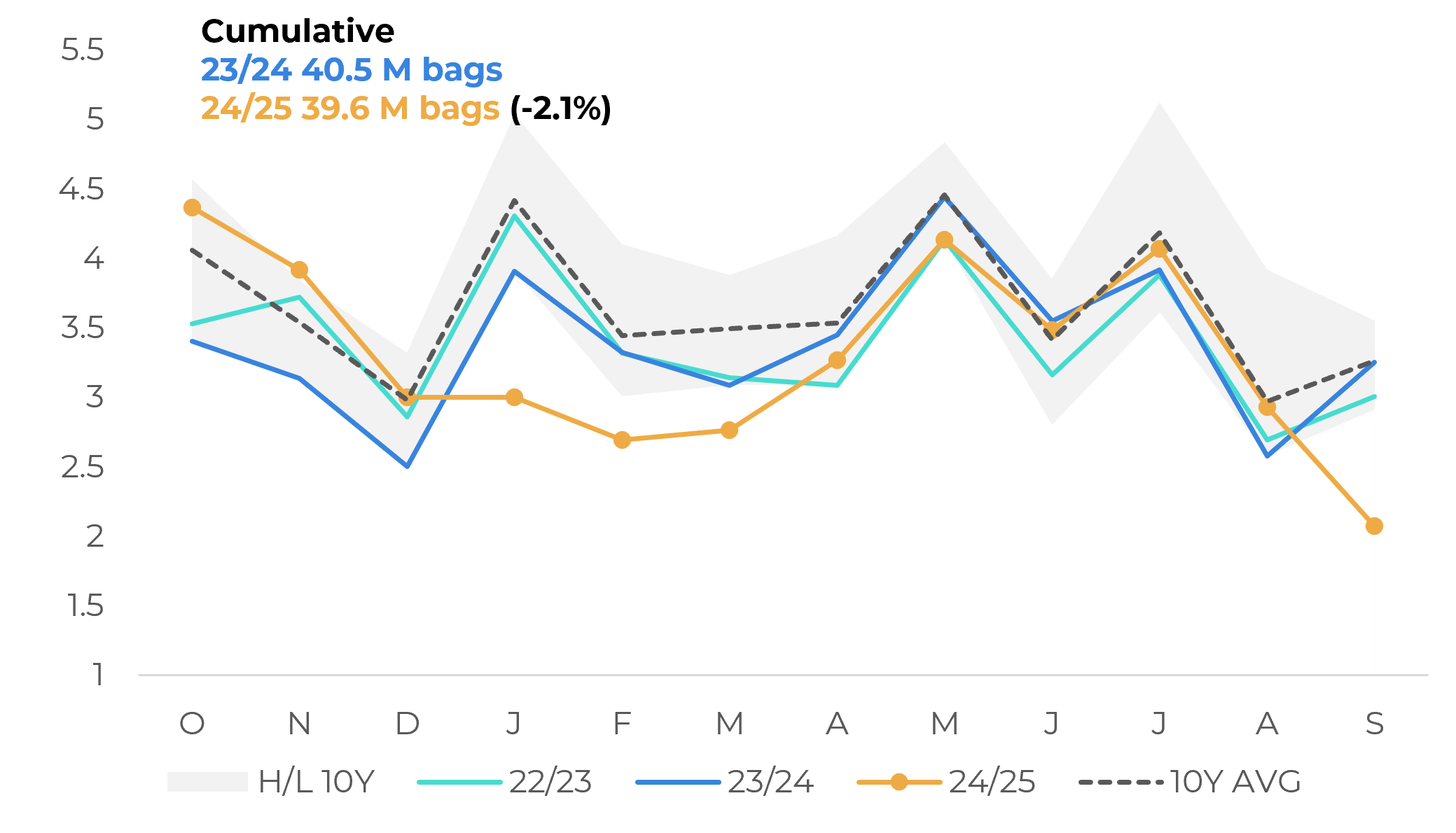
Source: European Comission
EU: Imports Share by Origin (% of total)
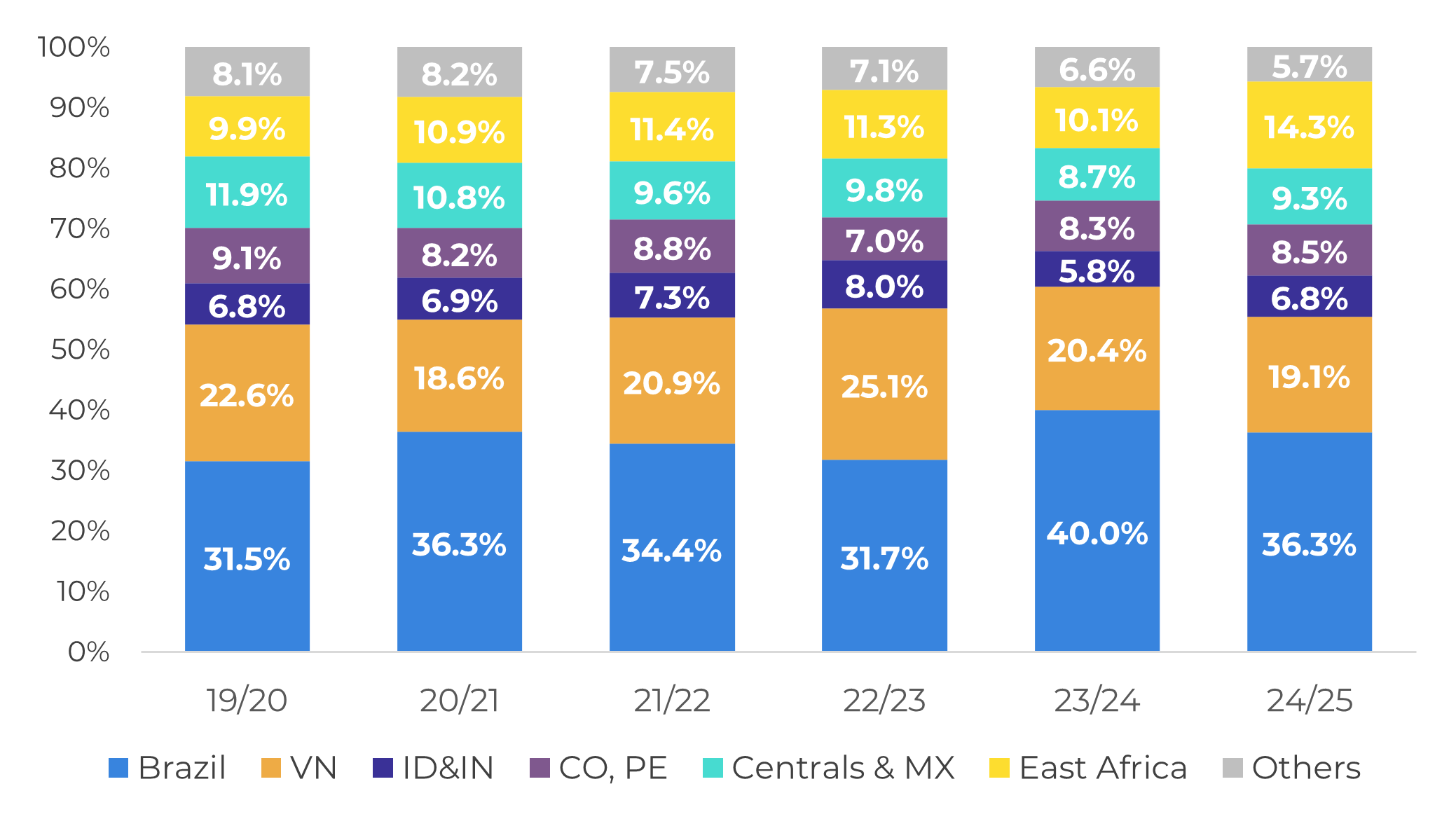
Source: European Comission
This trends in imports have also been reflected in the composition of the European Coffee Federation stocks, according to new data released on September 30. The share of Robusta in ECF stocks has increased considerably since May, when stocks began to recover, reflecting an increase in imports from Vietnam and Uganda. The share of washed Arabica in stocks has also increased, following higher imports from Central America and Ethiopia. However, natural beans decreased, mainly due to a drop in imports from Brazil, the largest supplier.
Although
the increase in Robusta and washed Arabica stocks provided a small recovery, it
is important to note that the figures remain at the lowest levels in years and
below those of 2024. Besides the drop in Brazilian exports in 2025, factors
such as high price volatility and spreads for Arabica and Robusta contracts, as
well as higher financial costs and interest rates, discourage stock formation
and could also contribute to the current low levels.
On
the other hand, apparent consumption (or disappearance) is showing signs of
resilience in the EU, which could be limiting the current recovery of stocks.
Considering net imports and stock variations over the past few months, the
cumulative figures for the 24/25 cycle (October 2024 to August 2025) reached
39.8 million bags. Although this is lower than in seasons such as 18/19 and
22/23, disappearance is still higher than in 23/24 and is in line with average
levels.
While this indicates a positive outlook for consumption, the future remains challenging, especially given current high prices, market volatility, and uncertainty. For example, looking only at imports, figures could remain lower for the remainder of 2025 because the EUDR has been postponed again, giving roasters more time to purchase coffee. Additionally, although disappearance indicates the resilience of demand in the EU, consumer coffee prices are still rising worldwide. Therefore, we cannot rule out a negative impact – or a flat scenario – on the 25/26 figures yet.
EU: European Federation Stocks by Type (M bags)
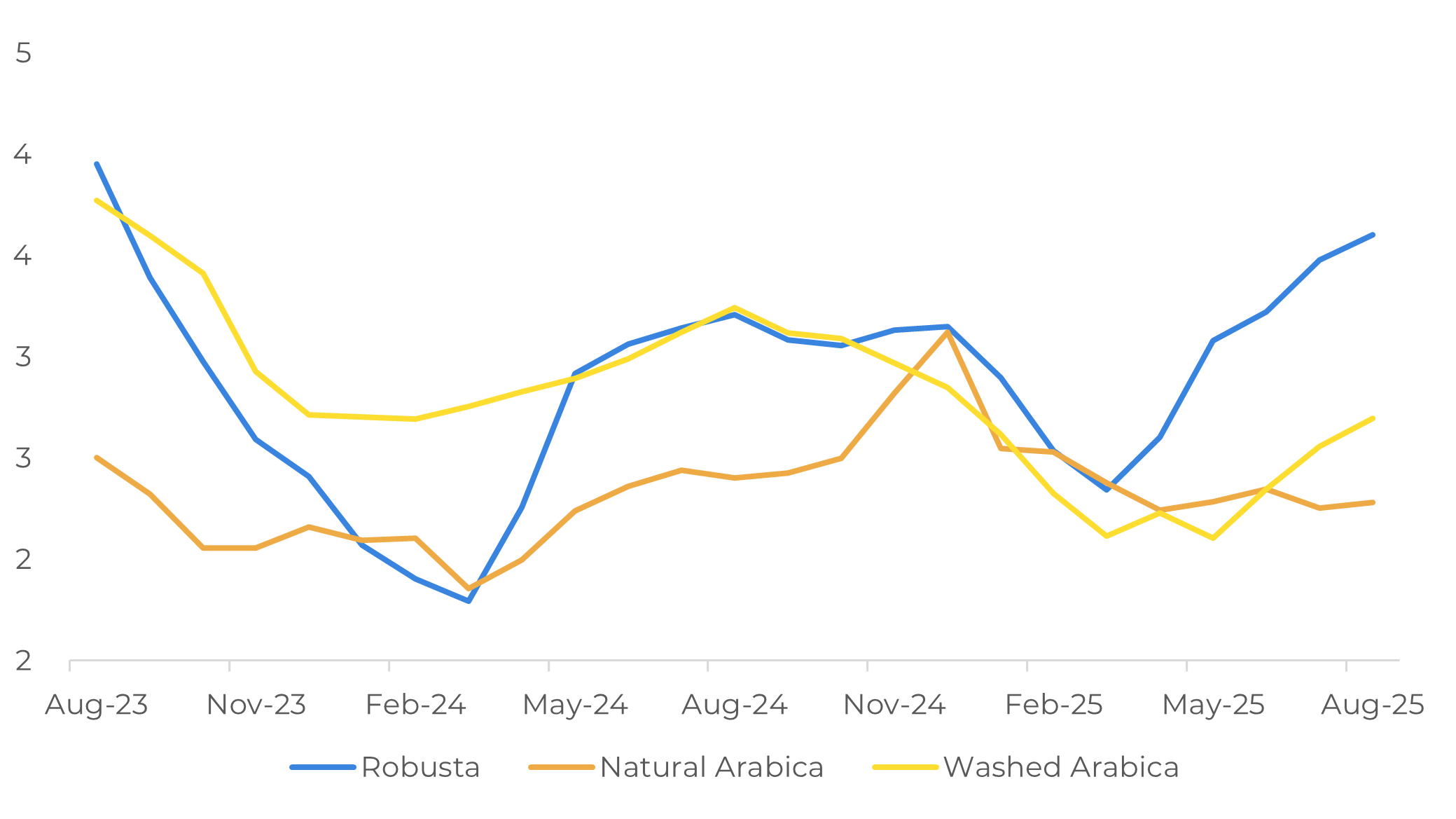
Source: ECF
EU: European Federation Stocks (M bags)
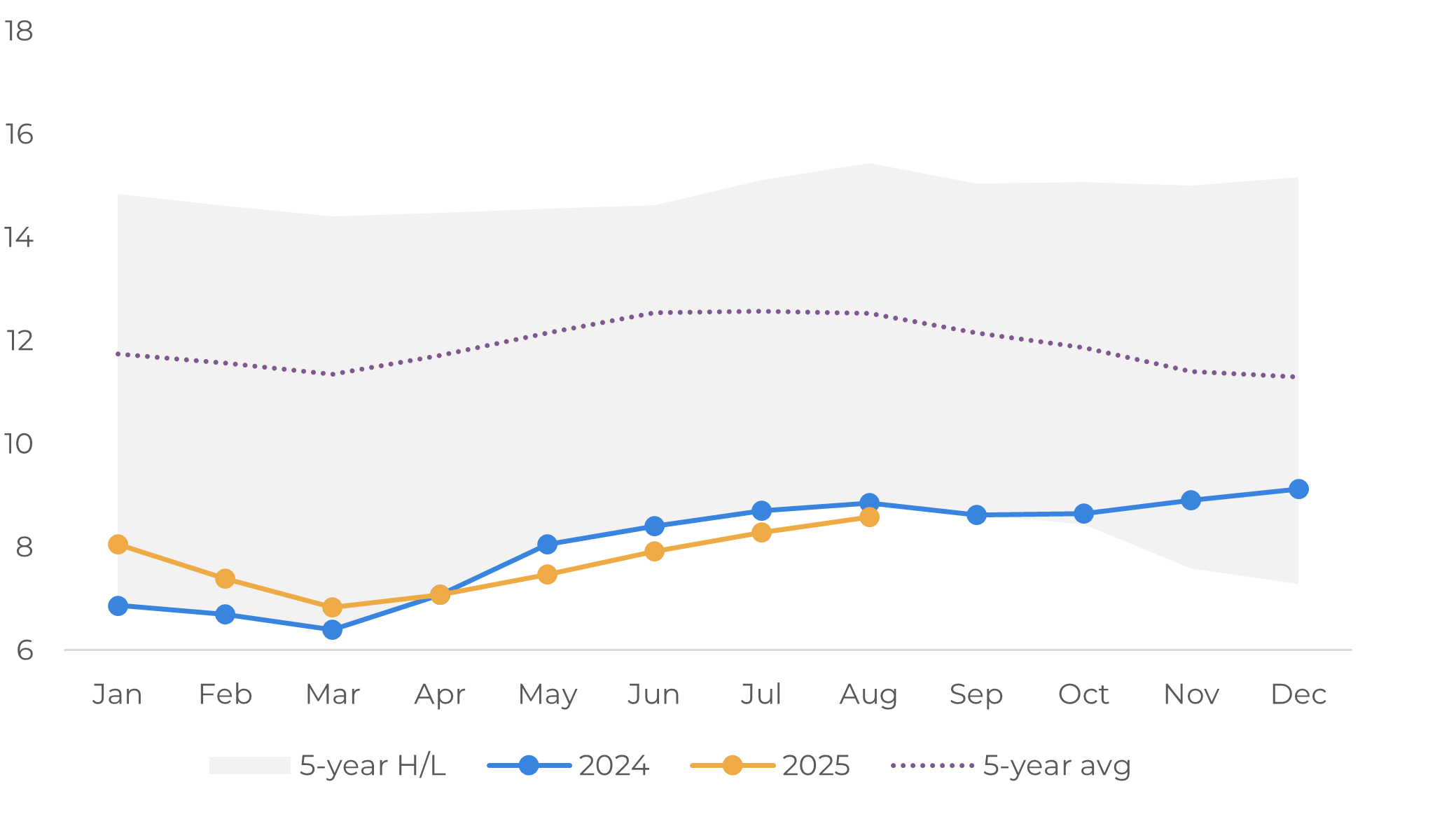
Source: ECF
Summary
Shifts in EU trading partners were notable: Brazil and Vietnam saw declines in market share due to supply restrictions and low stock levels, while countries like Indonesia, Central American countries, and East African nations gained ground. These changes were mirrored in the European Coffee Federation’s stock composition, with Robusta and washed Arabica shares rising thanks to increased imports from Uganda, Vietnam, Central America, and Ethiopia. In contrast, natural beans declined due to reduced Brazilian imports in 2025.
Despite modest stock recovery, levels remain historically low, hindered by price volatility, high financial costs, and interest rates. On the other hand, apparent consumption in the EU shows resilience, with figures higher than in 23/24. However, rising consumer prices and ongoing market uncertainty could still negatively affect import and consumption trends in the 25/26 cycle.
EU: Disappearance/Apparent Consumption (M bags)
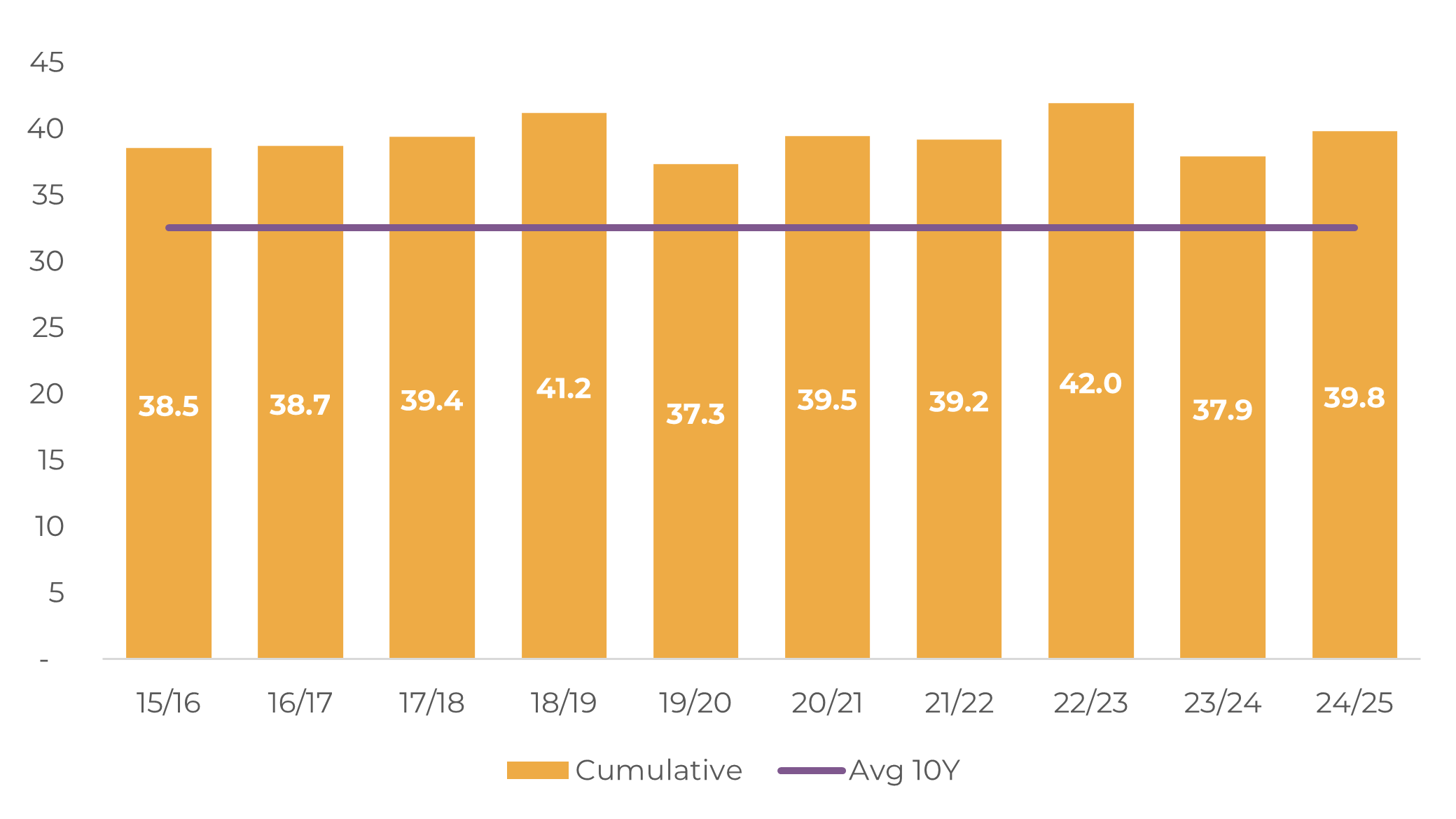
Source: European Comission, ECF, Hedgepeoint - Cumulative figures Oct-Aug
EU: Seasonal Disappearance/Apparent Consumption (M bags)
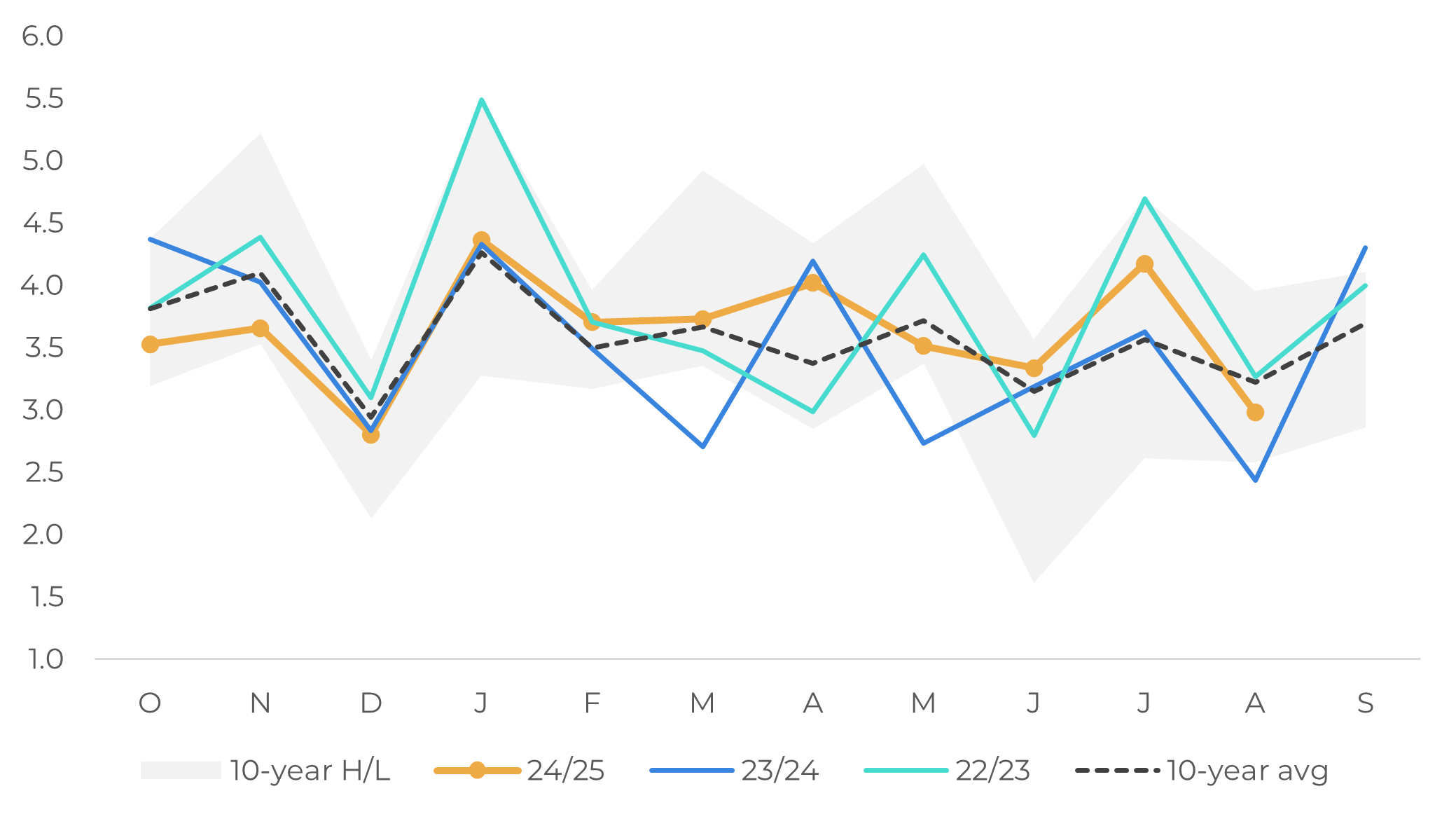
Source: European Comission, ECF, Hedgepeoint
Weekly Report — Coffee
laleska.moda@hedgepointglobal.com
thais.italiani@hedgepointglobal.com
Disclaimer
This document has been prepared by Hedgepoint Schweiz AG and its affiliates (“Hedgepoint”) solely for informational and instructional purposes, without intending to create obligations or commitments to third parties. It is not intended to promote or solicit an offer for the sale or purchase of any securities, commodities interests, or investment products. Hedgepoint and its associates expressly disclaim any liability for the use of the information contained herein that directly or indirectly results in any kind of damages. Information is obtained from sources which we believe to be reliable, but we do not warrant or guarantee the timeliness or accuracy of this information. The trading of commodities interests, such as futures, options, and swaps, involves substantial risk of loss and may not be suitable for all investors. You should carefully consider wither such trading is suitable for you in light of your financial condition. Past performance is not necessarily indicative of future results. Customers should rely on their own independent judgment and/or consult advisors before entering into any transactions. Hedgepoint does not provide legal, tax or accounting advice and you are responsible for seeking any such advice separately. Hedgepoint Schweiz AG is organized, incorporated, and existing under the laws of Switzerland, is filiated to ARIF, the Association Romande des Intermédiaires Financiers, which is a FINMA-authorized Self-Regulatory Organization. Hedgepoint Commodities LLC is organized, incorporated, and existing under the laws of the USA, and is authorized and regulated by the Commodity Futures Trading Commission (CFTC) and a member of the National Futures Association (NFA) to act as an Introducing Broker and Commodity Trading Advisor. HedgePoint Global Markets Limited is Regulated by the Dubai Financial Services Authority. The content is directed at Professional Clients and not Retail Clients. Hedgepoint Global Markets PTE. Ltd is organized, incorporated, and existing under the laws of Singapore, exempted from obtaining a financial services license as per the Second Schedule of the Securities and Futures (Licensing and Conduct of Business) Act, by the Monetary Authority of Singapore (MAS). Hedgepoint Global Markets DTVM Ltda. is authorized and regulated in Brazil by the Central Bank of Brazil (BCB) and the Brazilian Securities Commission (CVM). Hedgepoint Serviços Ltda. is organized, incorporated, and existing under the laws of Brazil. Hedgepoint Global Markets S.A. is organized, incorporated, and existing under the laws of Uruguay. In case of questions not resolved by the first instance of customer contact (client.services@Hedgepointglobal.com), please contact internal ombudsman channel (ombudsman@hedgepointglobal.com – global or ouvidoria@hedgepointglobal.com – Brazil only) or call 0800-8788408 (Brazil only). Integrity, ethics, and transparency are values that guide our culture. To further strengthen our practices, Hedgepoint has a whistleblower channel for employees and third-parties by e-mail ethicline@hedgepointglobal.com or forms Ethic Line – Hedgepoint Global Markets. “HedgePoint” and the “HedgePoint” logo are marks for the exclusive use of HedgePoint and/or its affiliates. Use or reproduction is prohibited, unless expressly authorized by HedgePoint. Furthermore, the use of any other marks in this document has been authorized for identification purposes only. It does not, therefore, imply any rights of HedgePoint in these marks or imply endorsement, association or seal by the owners of these marks with HedgePoint or its affiliates.

